Top Pool Heaters of 2025: Extend Your Swim Season Year-Round
May 22th, 2024
May 22th, 2024
Warm afternoons spent basking in the sun by your poolside are undeniably idyllic, yet nothing can abruptly end the fun like a chilly dip in cold water. The key to transforming these moments into year-round enjoyment lies in a reliable pool heater. In 2024, technological advancements have offered pool enthusiasts an array of innovative options to keep those waters at the perfect temperature, regardless of the season.
Consider stepping into your backyard oasis where the water invites you with a gentle embrace rather than an icy splash. My own experience with above ground pool heaters opened my eyes to how game-changing this seemingly simple addition can be. Gone are the days when the pool remained dormant for half the year, its potential untapped due to icy chills. Now, weekend barbecues, evening swims, and impromptu pool parties are the norm, not the exception.
The market is brimming with choices, each boasting its own benefits. From solar-powered solutions that harness the sun’s natural energy to more traditional electric heaters offering precise control, there’s a perfect fit for every pool owner’s needs. Making an informed choice means understanding not just the technical specifications, but also how a heater integrates into your lifestyle. Welcome to a world where your pool becomes an all-season retreat, no longer at the mercy of unpredictable weather.
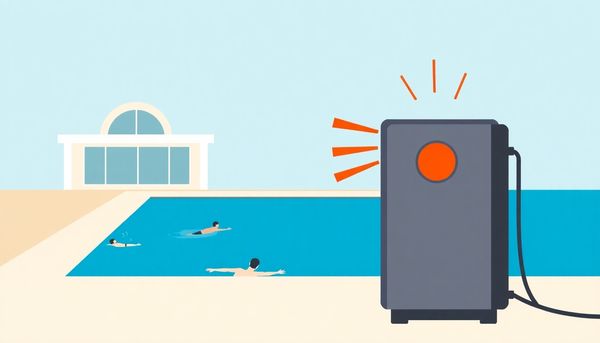
Selecting the perfect pool heater can transform chilly swims into warm, inviting dips, ensuring your above-ground pool remains the centerpiece of summer fun. The quest for the ideal heater involves more than just finding a model that suits your budget; it's about harmonizing with your pool's size, your local climate, and, importantly, your own lifestyle.
Consider this: if you live in a region where the summers are mild and the pool water takes its sweet time to warm up, a gas heater, like the Raypak Natural Gas Heater, might be your best ally. I recall my friend Sarah, who lives in a similar climate, raving about how it quickly turned her frigid pool into a cozy spa-like retreat. Gas heaters, though with a heftier price tag and running cost, deliver quick results, making them worth every penny for those in need of instant warmth.
Alternatively, if you bask in the sunshine of warmer locales and are keen on sustainability, the SolarPro Solar Heater is a gem. It’s cost-effective and eco-friendly, though patience is key as it takes a few days to heat the water. My neighbor swears by it, having connected several units for his expansive pool, reveling in both the savings and the warm water.
For a blend of efficiency and power, the Hayward Electric Pool Heat Pump emerges as a formidable contender, particularly in moderate climates. It quietly performs its magic, ensuring your pool is always at the perfect temperature without skyrocketing energy bills.
Ultimately, the ideal heater is one that seamlessly fits your lifestyle, ensuring that your pool is ready for those spontaneous late-night swims or relaxed weekend gatherings.
When choosing the ideal pool heater, local climate is a pivotal consideration. The climate not only influences the effectiveness of the heater but also dictates the most cost-efficient and sustainable choice. In balmy, sun-drenched regions, solar heaters, like the SolarPRO, turn sunshine into your pool’s best friend, warming the water affordably over time. These systems harness solar energy, perfect for those long summer days when the sun is generous, making them a budget-friendly option, albeit slower to heat compared to others.
Conversely, if you reside where the chill bites harder, gas heaters like the Raypak Natural Gas Heater might be your reliable ally. Known for their rapid heating capabilities, gas heaters can boost water temperature significantly in a short span, which is particularly beneficial as autumn leaves start to fall. However, this power comes at a higher operating cost, and it’s essential to have a natural gas line handy, which can be a deal-breaker for some homeowners.
Meanwhile, areas with moderate climates present an opportunity to balance efficiency and effectiveness. Electric heat pumps, such as the Hayward Electric Pool Heat Pump, shine in these conditions, utilizing ambient air to maintain a consistent pool temperature without the steep energy bills associated with gas heaters. However, they do face challenges in extreme cold, where their efficiency drops.
Ultimately, understanding your local weather patterns over the pool season is crucial. This awareness ensures you select a heater that not only meets your thermal needs but also aligns with your ecological and financial goals.
Finding the perfect balance between warmth and efficiency in your pool can feel like a quest for the Holy Grail. Yet, with some savvy choices, your above-ground pool can become an energy-efficient oasis. First, consider the type of heater that suits both your budget and climate. Gas heaters, while effective, are notorious for devouring energy, translating to higher utility bills. Conversely, electric heat pumps capitalize on ambient air temperatures, offering a greener footprint for those in milder climates. They are a bit of an upfront investment, but their long-term savings are noteworthy.
In sunnier locales, solar heaters can be an eco-friendly delight. My friend Sam swears by his SolarPRO; although it takes patience as it doesn’t warm the water overnight, the cost savings are undeniable. Yet, for those with larger pools or less patience, combining solar with another method might be the golden ticket.
Additionally, simple habits can enhance efficiency. Utilizing a solar cover when not swimming can trap heat and reduce evaporation, effectively cutting down on heating needs. Regular maintenance is crucial—keeping the heater and filters clean ensures they operate at peak performance, preventing energy waste.
Embrace technology, too. Modern pool heaters offer programmable settings, allowing you to schedule heating times to match swimming hours, avoiding unnecessary energy use. With mindful choices and regular upkeep, achieving maximum energy efficiency is not just a possibility; it's a rewarding reality.
In the world of pool heaters, installation often feels like a daunting task. Yet, with the right approach, even the most complex setups can become manageable. First off, consider the nature of your chosen heater. For example, solar heaters are a dream for DIY enthusiasts. My neighbor, Mike, transformed his backyard into a poolside paradise by easily installing a solar heater over a weekend. These systems are low-maintenance, requiring neither gas lines nor electrical wiring, making them a straightforward choice for those who enjoy a hands-on approach.
Gas heaters, on the other hand, demand a bit more nuance. These powerful units often require professional installation, especially if you lack an existing gas line. I remember a friend who attempted to install a gas heater on his own, only to realize the complexities involved, leading him to finally call in a professional. It's essential to ensure all connections are secure to prevent leaks and ensure efficient operation.
Electric heat pumps sit somewhere in the middle. While they can be a DIY project for those comfortable with basic plumbing and electrical work, many opt for a professional to handle the electrical connections—after all, safety around water and electricity is paramount.
Ultimately, having a clear understanding of your heater's requirements can streamline the installation process. Whether you're harnessing the sun's power or tapping into gas or electric, a well-planned installation ensures your pool is ready to enjoy throughout the season.
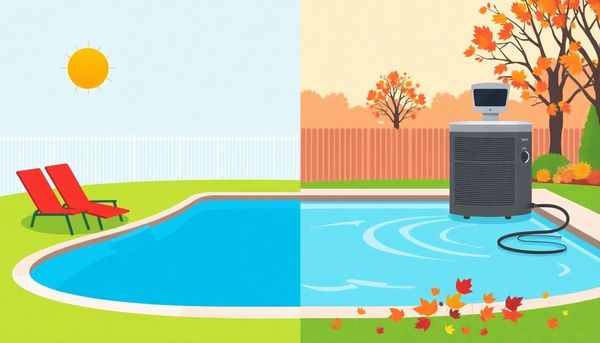
When the sun begins to dip and evenings turn cooler, squeezing the most enjoyment out of your pool becomes a dance of temperature and time. Embracing the potential of a well-chosen pool heater can transform those fleeting summer days into an extended season of aquatic leisure. The art of maximizing efficiency lies not only in selecting a heater that aligns with your needs but in orchestrating its use with precision.
Start by understanding your pool's unique needs. A smaller pool tucked in a sunny corner of your garden might thrive under the gentle warmth of a solar heater, allowing you to harness sunlight without breaking the bank. For larger pools or those set in shadier spots, a robust solution like a natural gas heater could be your key to quick warmth and comfort. Consider the specifics: a Raypak Natural Gas Heater can boost temperatures by 30 degrees, a perfect fit for crisp, autumn nights.
However, efficiency doesn't end with selection. Regular maintenance, such as checking for leaks and ensuring filters are clean, can drastically improve your heater's performance. Smart usage also means using a solar cover to trap heat overnight, reducing the workload on your heater come morning. By tailoring your approach based on your pool's characteristics and the local climate, you can enjoy a longer season without escalating costs, transforming your backyard into a personal paradise well past the summer solstice.
Selecting the perfect pool heater is akin to finding the right tool for a specific job. You wouldn't use a sledgehammer to hang a picture, and in the same vein, not every heater suits every pool or climate. Consider the patchwork of your surroundings: a sprawling backyard in a sunny locale might whisper for a solar heater, while a misty, cool climate might shout for the robust power of a gas heater. Each heater type—gas, electric, or solar—offers unique advantages and challenges, much like the seasons they help you conquer.
Reflecting on my own experience, living in a region where summer can be as fleeting as a surprise snowfall, a natural gas heater became my secret weapon. The Raypak Natural Gas Heater didn’t just warm the pool; it extended the warmth of summer right into autumn’s embrace. This heater’s rapid warmth was invaluable, yet I was aware of its appetite for energy and the costs it brought along.
Meanwhile, friends in sun-soaked regions have sung praises of their SolarPro Solar Heaters. Their pools, they tell me with a smile, gently rise in temperature, mirroring the sun’s daily journey across the sky. It’s slower, true, but sustainable and kind to the wallet.
For those who live in temperate zones, an electric heat pump might be your Goldilocks solution—not too hot, not too slow. The Hayward HeatPro strikes a balance, siphoning ambient warmth efficiently and quietly. Whichever path you choose, ensure it aligns with both your environment and your expectations, promising warmth and joy for years to come.
Selecting the right pool heater is only part of the equation; ensuring a seamless installation necessitates careful measurement and planning. Begin by assessing your pool’s dimensions and location. An accurate understanding of your pool’s volume is essential, as it directly influences the size and type of heater you’ll need. A friend of mine overlooked this step and ended up with a heater that couldn't keep up with their pool's demands, leading to frustration and additional expenses.
Consider the space available for installation. Gas heaters need proximity to a gas line, so check if one is accessible without extensive modifications. My neighbor had to reroute his whole setup because he didn’t account for this. Electric heaters require a robust electrical connection, and solar heaters necessitate ample sun exposure and space for panels. Sketch a layout of your yard or pool area, marking potential locations where the heater could be installed efficiently.
Accessibility for maintenance and repairs is another factor. Ensure the heater is easy to reach without disturbing other pool equipment. If you're looking at a DIY installation, solar heaters are generally more straightforward, while gas and electric models might benefit from professional help. This foresight in planning can save time and prevent unforeseen costs. Remember, a well-planned installation enhances heater efficiency and longevity, providing warm pool waters for many seasons.
Achieving the perfect dip in your above ground pool without breaking the bank requires a keen focus on energy efficiency. Think of it like choosing between a sports car and a hybrid vehicle; both get you to your destination, but one does so with a much lighter impact on your wallet. An energy-efficient pool heater not only saves money but also contributes to a more sustainable environment.
Consider the Hayward Electric Pool Heat Pump, a model that skillfully balances power and efficiency. Unlike traditional heaters that gulp down gas, this pump sips electricity, using ambient air to warm your pool. The result is a lower electric bill and a pool that's comfortably heated without the environmental guilt trip. Personal experience has shown that while these pumps may take a little longer to heat the water than gas heaters, the savings on utilities can be substantial.
Meanwhile, solar heaters like the SolarPRO offer a different take on efficiency. Harnessing the power of the sun, they provide a slow but steady increase in temperature. They're ideal for those in sunnier climes who aren't in a rush to dive into warm waters. It's fascinating to watch how a simple setup can elevate pool temperatures over a few days, all while remaining gentle on the environment and the budget.
Efficient heating solutions often involve trade-offs, but with a range of options from electric heat pumps to solar alternatives, there's a path to efficiency suited to every pool owner's needs and climate conditions.
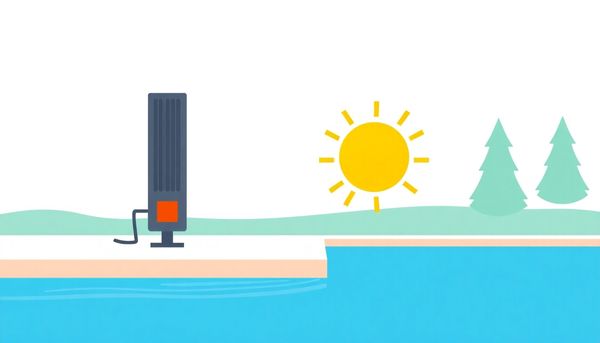
Selecting the right heater for your above-ground pool is akin to finding the perfect companion for your summer escapades. It’s more than just numbers and specifications; it’s about understanding your unique needs and how each option aligns with them. Remember that day when you wanted to jump into warm water but realized too late that the heater was too slow? Avoid such mistakes by considering what truly matters: pool size, climate, energy efficiency, heating speed, and installation ease.
Start with your climate. If you live in a chilly region, a robust natural gas heater like the Raypak could be your best bet. It’s like having a turbocharged engine in your backyard, ready to warm up your pool within minutes. But be mindful of the utility bills that come with such power.
For those of us basking under milder skies, the Hayward HeatPro electric heat pump stands out. It’s the quiet achiever, harnessing ambient air to heat your water efficiently. While it’s a bit gentler on the power front compared to gas heaters, it might struggle in colder snaps.
On a budget? The SolarPRO solar heater is your sustainable sidekick, especially if patience is your virtue. With sunlight as its ally, it gradually warms your pool, proving easy on both the environment and your wallet. However, it does take its sweet time to heat things up.
In the end, your choice boils down to striking a balance between immediate comfort and long-term savings. Consider your priorities, and let your poolside moments be nothing short of perfect.
Understanding your climate needs is a crucial step in choosing the perfect heater for your above-ground pool. If you live in a region where summer nights drop significantly in temperature, a gas heater might be your best bet. These heaters provide a powerful punch, rapidly warming your water even when the mercury dips. However, keep in mind the ongoing fuel costs, as natural gas prices can fluctuate.
On the flip side, if you're blessed with an abundance of sunny days, why not harness the sun's natural energy? Solar heaters, though slower, offer an eco-friendly and budget-conscious solution. They work exceptionally well in sunny climates, gradually raising your pool's temperature over days rather than hours. It's a laid-back approach, much like letting a loaf of bread rise slowly for a perfect bake.
For those residing in moderate climates, an electric heat pump stands as an efficient middle ground. Drawing warmth from the air, it efficiently circulates it into your pool, balancing cost and effectiveness. These systems shine brightest when the ambient temperature doesn’t stray too far from your ideal swimming conditions.
Ultimately, your climate dictates your pool heater choice. Consider your local weather patterns throughout your swimming season. Each type of heater has its merits and downfalls, and aligning them with your specific climate needs ensures a longer, more enjoyable pool season.
Navigating the installation of your above ground pool heater requires a bit of forethought, akin to assembling a puzzle where each piece must find its perfect spot. It's not merely about connecting a few hoses and plugging in a unit; rather, it's a process that demands you consider the nuances of your space, resources, and technical know-how.
Start with location—each heater type has its requirements. A gas heater, for instance, demands proximity to a natural gas line, which may necessitate professional installation if none exists nearby. I recall my neighbor, who faced unexpected costs because his dreamy backyard setup didn't include a gas line. Meanwhile, electric heaters, although requiring less space, still need a safe electrical connection, which ideally should be handled by a certified electrician to avoid any water-related mishaps.
Solar heaters, while simpler, might test your spatial creativity. They need a sunny spot, sometimes requiring mounting on roofs or fences to maximize efficiency. Imagine having to rearrange your garden layout—like my colleague who had to relocate her prized rose bushes just to make room for the solar panels.
Before diving into DIY territory, weigh the complexity of each installation. Solar heaters often allow for a simple weekend project, whereas gas and electric models might benefit from professional expertise. This ensures not only safety but also optimal performance, saving you from surprise future headaches. So, take a moment to assess your setup, enlist help if needed, and set the stage for a seamless installation.
Finding the right heater for your above-ground pool is only part of the equation. The secret to a long-lasting and cost-effective heating system lies in optimizing energy efficiency. Consider this: each type of heater comes with its own energy demands, so understanding how to maximize their potential can save you a significant amount on your utility bills.
For instance, with natural gas heaters like the Raypak, small adjustments can lead to big savings. Installing a solar cover when the pool isn’t in use can prevent heat loss, allowing your heater to work less to maintain your desired temperature. Similarly, using the heater during off-peak hours can also reduce energy costs.
Electric heat pumps, such as the Hayward HeatPro, are inherently more energy-efficient but require strategic placement to harness ambient air effectively. Situating the heat pump where it captures the most sun and airflow can enhance its efficiency, especially in milder climates. Regular maintenance, such as cleaning the heat exchanger, ensures it operates at peak performance.
For solar heaters like the SolarPRO, positioning is key. Placing the solar panels at an optimal angle facing the sun ensures maximum heat absorption. Combining solar heaters with an efficient pump system can further circulate water through the solar panels more effectively, increasing the heating impact.
By combining these strategies with thoughtful usage, you can enjoy a warm pool without the financial worry, extending your swimming season and enhancing your poolside experience.
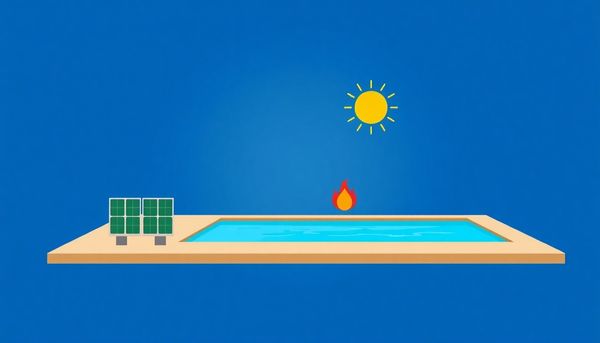
When the weekend rolls around and the sun begins to set earlier, a warm pool can transform chilly evenings into perfect family gatherings. A reliable pool heater is key to extending that outdoor swim season into the cooler months, turning what might be a brief summer indulgence into a year-round delight.
Selecting the right pool heater involves more than just glancing at price tags. It’s about understanding the unique needs of your swimming environment. In areas where the mercury takes frequent dips, a robust gas heater like the Raypak Natural Gas Heater can be your best ally. It heats water quickly, letting you enjoy a comfortable swim even as the temperatures drop. The flip side is the heavier utility bill, but for many, the trade-off is a worthwhile investment for more poolside memories.
If energy efficiency is a priority, the Hayward Electric Pool Heat Pump provides an excellent balance. This option shines in moderate climates, drawing warmth from the surrounding air to gently elevate water temperatures. It’s an upfront investment that pays off by saving on energy costs over time, though it’s not the ideal choice for frosty winters.
For those blessed with sun-drenched backyards, the SolarPRO Solar Heater offers a budget-friendly, eco-conscious solution. Patience is required, as this system heats gradually, but it's perfect for environmentally minded pool owners who relish the sun’s free gift. Embrace the right heater for your pool, and those twilight swims will become the cherished norm.
Navigating the world of above ground pool heaters can feel like uncovering layers in a puzzle. Each piece—whether it’s a natural gas heater, an electric heat pump, or a solar-powered option—offers distinct advantages tailored to different needs. For those with substantial pools or cooler climates, a gas heater like the Raypak provides robust power, swiftly raising water temperatures to extend swim seasons. Though it impresses with speed, it hits the wallet with higher energy costs and installation expenses, requiring access to a gas line.
On the flip side, electric heat pumps offer an energy-efficient balance, ideal for mild climates. The Hayward HeatPro excels by drawing warmth from ambient air, easing the strain on your electricity bill while maintaining a comfortable pool temperature. Yet, its performance may wane in the chill of colder environments, so it’s essential to consider local weather patterns when opting for this solution.
For the economically conscious or eco-minded, solar heaters like the SolarPro Curve stand as a beacon of sustainability. Using sunlight to gradually warm water, these heaters minimize costs and environmental impact. However, they demand patience, as they heat slowly and work best in sun-soaked locales. Ultimately, aligning your choice with pool size, climate, and budget ensures a heater that harmoniously melds with your lifestyle, offering years of aquatic enjoyment.
When it comes to heating your above-ground pool efficiently, every degree counts, not just in terms of warmth but also in energy savings. Selecting a heater that aligns with both your pool size and local climate can make all the difference in your energy bill and environmental impact. I once spent a summer experimenting with different heating options for my own pool, and the insights gained were both enlightening and cost-saving.
First, it's essential to understand that the balance between power and efficiency can vary significantly between heater types. Gas heaters, such as the Raypak Natural Gas Heater, offer rapid heating, making them ideal for cooler climates. However, they consume more energy and can lead to higher utility costs. Despite their upfront cost, they’re unrivaled in speed and reliability when quick heat is needed.
For those in milder climates, the Hayward Electric Pool Heat Pump stands out for its use of ambient air to generate heat. This method not only reduces electrical consumption but also minimizes greenhouse gas emissions. I remember installing one myself; the difference in my monthly bills was pleasantly surprising.
Solar options, like the SolarPRO Solar Heater, are the epitome of energy efficiency. Harnessing the sun’s rays, they offer a sustainable way to maintain water temperatures, albeit at a leisurely pace. While waiting a few days for those extra degrees might test your patience, the long-term savings and reduced environmental impact are worth the wait.
In conclusion, maximizing energy efficiency requires an understanding of your local environment and the specific demands of your pool. Whether you're opting for the rapid heat of a gas heater or the eco-friendly appeal of solar, choosing wisely can extend your pool season and preserve your wallet.
In the world of pool heaters, installation often feels like an intimidating hurdle, but it doesn't have to be. Whether you're a DIY enthusiast or a first-timer, the process can be straightforward with a little preparation. Just think of it as setting the stage for countless enjoyable swims in perfectly warm water.
First, consider whether your chosen heater aligns with your DIY skills. Solar heaters, like the SolarPro, shine in this respect. They typically require minimal setup—just position them to maximize sunlight exposure and connect the hoses to your pool’s circulation system. For those who prefer a no-fuss approach, solar heaters are the go-to option.
On the other hand, electric heat pumps, such as the Hayward HeatPro, offer a middle ground. While they demand a bit more effort than solar options, they often come with comprehensive manuals and straightforward steps. However, having an electrician involved ensures all electrical connections are safe, especially since water and electricity aren’t the best of friends.
For those eyeing the robust Raypak Natural Gas Heater, a professional installation is advisable. This type of heater requires not only hooking up to your pool’s system but also connecting to a natural gas line, a task best left to experts to avoid potential safety hazards.
No matter which path you choose, make sure to map out your setup location. Factors like proximity to electricity or gas lines and access to sunlight (for solar) can streamline the process. Once everything is in place, you’ll find the effort pays off each time you take that first warm dip of the season.
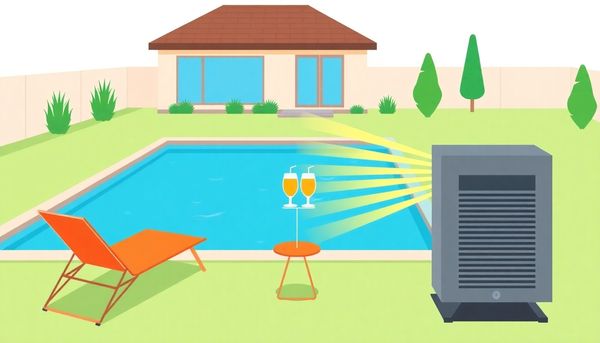
When it comes to maximizing your savings with an above-ground pool heater, strategic installation is key. Proper positioning and setup can significantly affect both your operating costs and the heater's efficiency. When I first installed my pool heater, I learned that the location played a crucial role in its performance. Placing a solar heater in a spot that receives maximum sunlight throughout the day, for instance, can make a noticeable difference in how quickly your pool heats up. Similarly, gas and electric heaters benefit from proximity to the pool's filtration system, reducing the distance water must travel and enhancing energy efficiency.
Another important factor to consider is insulation. Adding a solar blanket or cover not only aids in retaining the heat but also prevents evaporation, which is a common cause of heat loss. This simple addition can extend the life of your heating investment while keeping costs down. For those using electric or gas heaters, routine maintenance and cleaning can prevent energy wastage due to inefficiency. A friend of mine saw a 15% drop in energy costs after scheduling regular maintenance for her heat pump.
Lastly, leveraging natural resources, like windbreaks around the pool area, can significantly reduce heat loss caused by wind. By carefully planning the installation and considering environmental factors, you can optimize your pool heater for long-term savings, keeping your pool warm without burning a hole in your pocket.
Selecting the ideal heater for your above-ground pool can feel like navigating a maze of options, each with its unique features and limitations. It's akin to choosing the perfect outfit for a fluctuating weather day—where one minute it’s sunny, and the next it’s pouring rain. In the realm of pool heaters, the guiding factors include your pool size, local climate, and energy efficiency. Quick heating might be your priority, or perhaps a lasting solution that doesn't drain your wallet every month. For instance, my neighbor once opted for a natural gas heater because their pool parties never coincided with sunny days, and they needed rapid heating on demand. However, they soon discovered that running it constantly led to soaring utility bills.
Gas heaters, like the Raypak, offer unparalleled speed in heating, making them ideal for spontaneity and colder climates. But remember, with great power comes a hefty price tag and the necessity for a gas line. Conversely, if your focus is sustainability and cost-effectiveness, a heat pump might be your best bet, especially in moderate climates. It’s akin to harnessing nature’s own warmth, albeit slowly. For those basking in the glory of abundant sunshine, the SolarPro solar heater stands out as the most budget-friendly choice. It’s a patient companion, gradually warming your pool over days, perfect for those who plan ahead. Whatever your preference, aligning the heater type with your specific needs ensures those lazy, sun-soaked poolside afternoons are just a button press away.
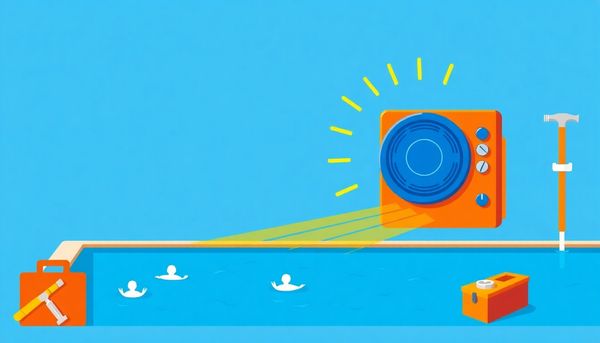
This article provided insights into maintaining your pool. Start your pool care journey today!
Want to become a pool maintenance expert? Our free Pool School course covers everything you need to know about pool care. From basic maintenance to advanced troubleshooting, you'll learn how to:
Join over 10,000 pool owners who have already transformed their pool care routine. Get started with our free Pool School course today!